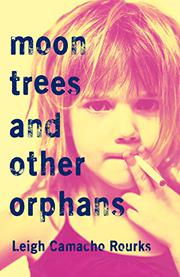Reviewed by Hannah Parker

Leigh Camacho Rourks’s debut, Moon Trees and Other Orphans, is a riveting collection of short stories traversing the narratives of numerous down-trodden teens who find themselves without an ideal upbringing. Rourks writes in an expeditious tone, with intentional sentences leaving the reader clinging on to every letter. Each short story begins swiftly enough to capture the interest and attention of the reader, yet ends abruptly, leaving the reader wanting more. Moon Trees and Other Orphans is a brisk yet fulfilling collection of prose that is a roller coaster of a story from beginning to end.
The novel’s namesake, physical moon trees, are for all intents and purposes a fascinating phenomenon that leaves readers interested to learn more on the subject. The tale comes from the true events of Stuart Roosa on his Apollo 14 mission in 1971 in which he took hundreds of tree seeds with him in his travel kit to the moon. These seeds were inevitably brought back to earth and planted around the globe. In the first short story, the protagonist Essie’s mother, in her state of paranoia, believed that her daughter was conceived after she herself swallowed a moon tree seed. Essie held on to this tall tale for years, struggling to connect these myths and stories, often turning to these tales as a substitute for a healthy family and cookie-cutter upbringing. While she knew the father of her brother, Stuart, she often pictured her own father to be none other than the astronaut Stuart Roosa.
Each story ends with a sense of longing from the reader, begging to get more closure on the family at hand. While it is a quick read, it is almost too quick – each story ended almost instantaneously as if Rourks decided to stop narrating in the middle of the thought. While this might be frustrating to some, it could be considered symbolic of the plight of the “orphans” within the collection.
The most compelling part of Moon Trees and Other Orphans is the ability that Leigh Camacho Rourks has for so quickly pivoting between harsh reality and fairy tale illusions. One might make the conclusion that this is what life is like for Essie and Stute in the first story, having to go back and forth with their childhood while also caring for someone in a less than lucid mental state. While the reality of this story leaves you emotionally exhausted, the ethereal contrast of the mothers’ schizophrenic episodes is an admirable escape. This theme is found throughout the novel from story to story, consistently leaving the reader to ponder on the mental state of the author herself.
Many of the protagonists in this collection of stories share a compelling wit and hardness to them that makes them considerably admirable to the reader. It’s this endearing commitment to survival in the face of the unfairness of her situation that fills Moon Trees and Other Orphans with such captivating and three-dimensional characters. With characters like this, Rourks is likely not to disappoint with future novels and prose.
Leigh Camacho Rourks’s debut novel is likely to make an impact on bookshelves to come. Rourks’s dark and somewhat twisted narrative is packed with detail that transports readers into a setting where they might have never found themselves organically. A majority of settings in the short stories that Rourks writes about are set in the heart of the bayou in Louisiana. Rourks illustrates a clear picture of what life is life in the thick humid air of New Orleans. In a somewhat impoverished Louisiana, you’re transported to a life of mosquitoes, Bourbon Street, and the just-out-of-reach Louisiana State University. Rourks herself is from Central Florida, making her description of this setting all the more impressive.
Moon Trees and Other Orphans, recipient of the St. Lawrence Book Award, is a book that will likely make its way onto many “to read” lists and wish lists in the coming years. It’s a quick and comprehensible read, leaving you satisfied with the plot yet disappointed for its inevitable end. Rourks colorful language and style of writing are impeccable. She has an amazing ability to write every sentence in a succinct fashion, yet making it just detailed enough to paint a vivid picture in your mind. Overall, Rourks debut novel sets a high bar for publications to come.
